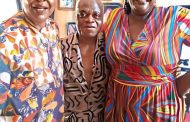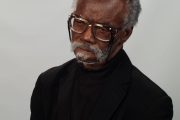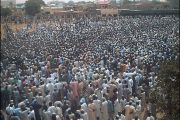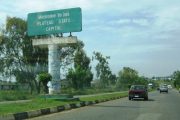It is exactly 3 years today, May 29th, 2020 when Professor Abubakar Momoh died suddenly in 2017. He is still remembered across the many spaces he traversed as a scholar, activist and administrator. The most significant space of remembrance of him on the third anniversary of his death and the 11th anniversary of another icon, Dr. Tajudeen Abdulraheem would seem to be the one holding tomorrow on the theme “From Global Financial Crisis to Global Coronavirus: Pan-Africanism and Transformation in Africa”.

The late Prof Abubakar Momoh

The late Dr. Tajudeen Abdul-raheem
Organised by the Centre for Democracy and Development, (CDD) and featuring half a dozen speakers, tomorrow’s occasion is able to bundle together the spirit of two of a kind. One is Abu Momoh while the second is Dr. Tajudeen, another Nigerian activist who took the Pan-Africanist vision beyond the books and classrooms to world capitals and inner sanctums of the global establishment such as the United Nations. It is still a mystery they all died in the month of May, Momoh in Nigeria in 2017 and Taju in Nairobi, Kenya in 2009.
It is difficult to immediately track what they said before as to predict what they would have said if they were to be around tomorrow except that they would certainly have been looking at how the global order is tumbling from one crisis to the other from the standpoint of the ‘African condition’: what explains it and how it can be overcome. Delivering the maiden version of the Emma Ezeazu Memorial lecture in Abuja in August 2016, Professor Momoh, for instance, described the Structural Adjustment programme, (SAP) as the worst and the most vicious form of economic exploitation in the history of Nigeria. It has not only led to de-industrialisation but also enthroned accumulation by speculation in which everything about accumulation “depends on how smart you are”.
According to the then Director-General of The Electoral Institute, (TEI), it was the period during which Nigeria was under SAP that many of the countries which just entered the great power club such as Brazil and its Asian counterparts laid the foundations of that status. In other words, it is SAP that held Africa down, making other continents to leave it behind, with no signs of its recovery. This, he said, is because, apart from de-industrialisation and corruption, SAP also left Nigeria a country of traders and front men feasting on oil rents instead of manufacturing which would have linked agriculture and industry. The outcome, he said, is the death of the visioning process, saying that if the truth must be told, the elite in Nigeria today lacks the values, mannerisms, interest and behavioral patterns that define the national elite as a society’s visioner. That being the case, the Nigerian elite finds it difficult to be ahead of the rest of the society in terms of what is sacrosanct and binding to it or the discipline to sustain such collective vision which then becomes a society’s vision. But, for him, the elite disaster is not about bad morality of the individual members of the elite but something that must be understood within the logic of the prevailing political economy which he dubbed as perverted and contractocracy in nature rather than production.

 There is a sense in which it is sustainable to say it was typical of them to hold and express their views. It didn’t matter to them if such views coincided with that of the most powerful. As Momoh was categorizing the Nigerian elite in 2016 even as someone holding a government appointment at the time, so was Taju deriding the Military – Industrial – Media – Entertainment – Complex, (MIMEC) in the US in 2007 even as a UN staffer who was supposed to be diplomatic. He disagreed with analysts who were saying that the Military – Industrial – Media – Entertainment – Complex, (MIMEC) would stop Barrack Obama from being elected as president of the United States, comparing such analysts to astronomers who fell into a ditch looking up to the sky for signs of the rains when the rains had already dug deep trenches on the ground. Obama would not have arisen in the first case if the complex were that organised or constituted, he would say. Both Dr. Taju and Momoh did not divorce their activism from his work. In all cases, they were too generous with knowledge.
There is a sense in which it is sustainable to say it was typical of them to hold and express their views. It didn’t matter to them if such views coincided with that of the most powerful. As Momoh was categorizing the Nigerian elite in 2016 even as someone holding a government appointment at the time, so was Taju deriding the Military – Industrial – Media – Entertainment – Complex, (MIMEC) in the US in 2007 even as a UN staffer who was supposed to be diplomatic. He disagreed with analysts who were saying that the Military – Industrial – Media – Entertainment – Complex, (MIMEC) would stop Barrack Obama from being elected as president of the United States, comparing such analysts to astronomers who fell into a ditch looking up to the sky for signs of the rains when the rains had already dug deep trenches on the ground. Obama would not have arisen in the first case if the complex were that organised or constituted, he would say. Both Dr. Taju and Momoh did not divorce their activism from his work. In all cases, they were too generous with knowledge.
Thus, beyond the Pan-African conviction is their very similar personality disposition as to each become permanent exemplars. As a teacher, Abubakar Momoh, for instance, stayed above corruption in its widest sense. That is, he not only insisted on rigour or academic integrity and the moral minimum, he hated mediocrity and idolatry under whatever guise. That is the same disposition signposted by Taju’s critique of dogma in the above example.
As such strong willed individuals, they naturally came across fellow human beings who either misunderstood them or feared them. They each aggravated such by living above backward liberal tendencies of suspicion, backbiting or cliquism. Who could Momoh or Taju not confront with whatever allegations or claims against him or her? They were too straightforward and noble in disposition to get involved in suspicion and surreptitious manoeuvres. Momoh, for instance, agonized as much as he was amused by intrigues that he had taken a firm decision not to seek another term in office but to return to his lecturing job from which he was recruited as the pioneer Director-General of The Electoral Institute, the research arm of Nigeria’s election management body – Independent National Electoral Commission,(INEC). Whether he would have been allowed to go now rests in speculation. Until his appointment, Professor Momoh was the Dean of the Faculty of Social Sciences at the Lagos State University (LASU).

As it was in 2018

As it also was in 2018
While Tajudeen Abdulraheem was the world man who broke barriers and shone at such places as Oxford University where he broke the record of an Oxford graduate carrying placard right there on the campus immediately after earning his PhD, Momoh was the story of the intellectual as a global worker. Besides the Council for the Development of Social Science Research in Africa (CODESRIA) and the African Association of Political Science (AAPS), he was also a well bred ideologue of the Academic Staff Union of Universities, (ASUU) in Nigeria. before his demise, he had a researcher and lecturer at many universities across the world, from Visiting Research Fellow, Institute of Development Studies, University of Helsinki in Finland to Fellow, Department of Peace and Conflict Research, Uppsala University in Sweden; Visiting Scholar, Centre for African Studies, University of Cape Town in South Africa; Guest Researcher, Nordic Africa Institute in Sweden; Guest Lecturer, Summer Course on African Law, Catholic University, Brussels in Belgium; Senior Fulbright Scholar, James Coleman African Studies Centre, University of California, Los Angeles (UCLA) in the US; Guest Lecturer, African and African-American Studies Department, University of North Carolina, Chapel Hill in the USA; Visiting Researcher and Tutor, Conflict, Security and Development Group (CSDG), King’s College of the University of London and Visiting Senior Research Fellow, International Development Centre, Open University, Milton Keynes in England. He was also Post Graduate Research Supervisor, Bielefeld University, Bielefeld in Germany while also on the board of Abuja based Centre for Democracy and Development (CDD).




























